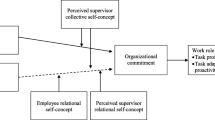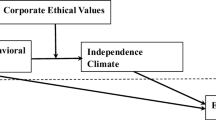Abstract
This study investigated the relationships between leader responsiveness to employee requests and employee attitudes and behaviors in a sample of managers and their subordinates. Additionally, the study investigated the moderating effect of an individual difference variable (equity sensitivity), on the relationships between leader responsiveness and employee attitudes and behaviors. Leader responsiveness related significantly with job satisfaction, organizational commitment, and organizational citizenship behavior. Furthermore, equity sensitivity moderated the relationships between leader responsiveness and job satisfaction. Entitleds reported lower job satisfaction when manager fulfillment of employee requests was low than did Benevolents, whereas differences were minimal when manager request fulfillment was high. Implications of the findings were discussed.

Similar content being viewed by others
References
Adams J. S., (1965). Inequity in social exchange Advances in Experimental Social Psychology 2: 267–299
Blau P. M., (1964). Exchange and power in social life Wiley New York
Bing M. N., Burroughs S. M., (2001). The predictive and interactive effects of equity sensitivity in teamwork-oriented organizations Journal of Organizational Behavior 22: 271–290
Cohen J., Cohen P., (1983). Applied multiple regression/correlation analysis for the behavioral sciences Erlbaum Hillsdale, N.J
Eisenberger R., Huntington R., Hutchison S., Sowa D., (1986). Perceived organizational support Journal of Applied Psychology 71: 500–507
Eisenberger R., Stinglhamber F., Vandenberghe C., Sucharski I. L., Rhoades L., (2002). Perceived supervisor support: Contributions to perceived organizational support and employee retention Journal of Applied Psychology 87(3): 565–573
Folger R., Greenberg J., (1985). Procedural justice: An interpretive analysis of personnel systems In Rowland K., Ferris G., (Eds.), Research in personnel and human resources management Vol. 3. JAI Press Greenwich, Ct pp. 141–183
Gouldner A. W., (1960). The norm of reciprocity: A preliminary statement American Sociological Review 25: 161–178
Greenberg J., Westcott D. R., (1983). Indebtedness as a mediator or reactions to aid In Fisher J. D., Nadler A., DePaulo B. M., (Eds.), New directions in helping. Academic Press New York (pp. 85–122)
Huseman R. C., Hatfield J. D., Miles E. W., (1985). Test for individual perceptions of job equity: Some preliminary findings Perceptual and Motor Skills 61: 1055–1064
Huseman R. C., Hatfield J. D., Miles E. W., (1987). A new perspective on equity theory: The equity sensitivity construct Academy of Management Review 12: 222–234
Kickul J.,0 Lester S. W., (2001). Broken promises: Equity sensitivity as a moderator between psychological contract breach and employee attitudes and behavior Journal of Business and Psychology 16: 191–217
King W. C. Jr., Miles E. W., (1994). The measurement of equity sensitivity Journal of Occupational and Organizational Psychology 67: 133–142
King W. C. Jr., Miles E. W., Day D. D., (1993). A test and refinement of the equity sensitivity construct Journal of Organizational Behavior 14: 301–317
Kottke J. L., Sharafinski C. E., (1988). Measuring perceived supervisory and organizational support Educational and Psychological Measurement 48: 1075–1079
Liden R. C., Sparrowe R. T., Wayne S. J., (1997). Leader-member exchange theory: The past and potential for the future In Ferris G. R., (Ed.), Research in personnel and human resource management . JAI Press Greenwich, CT
Locke E. A., (1976). The nature and causes of job satisfaction In Dunnette M. D., (Ed.), Handbook of industrial and organizational psychology Rand McNally Chicago (pp. 1297–1349)
Manogram, P., & Conlon, E. J. (1993). A leader–member exchange approach to explaining organizational citizenship behaviors. Paper presented at the annual meeting of the Academy of Management, Atlanta
Masterson S. S., Lewis K., Goldman B. M., Taylor M. S., (2000). Integrating justice and social exchange: The differing effects of fair procedures and treatment on work relationships Academy of Management Journal 43(4): 738–748
Mathieu J., Zajac D., (1990). A review and meta-analysis of the antecedents, correlates, and consequences of organizational commitment Psychological Bulletin 108: 171–194
Meyer J. P., Allen N. J., (1984). Testing the “side-bet theory” of organizational commitment: Some methodological considerations Journal of Applied Psychology 69: 372–378
Meyer J. P., Allen N. J., (1997). Commitment in the workplace: Theory, research and application Sage Thousand Oaks, CA
Miles E. W., Hatfield J. D., Huseman R. C., (1989). The equity sensitivity construct: Potential implications for worker performance Journal of Management 15: 581–588
Miles E. W., Hatfield J. D., Huseman R. C., (1994). Equity sensitivity and outcome importance Journal of Organizational Behavior 15: 585–596
O’Neill B. S., Mone M. A., (1998). Investigating equity sensitivity as a moderator of relations between self-efficacy and workplace attitudes Journal of Applied Psychology 83: 805–816
Ostroff C., (1992). The relationship between satisfaction, attitudes, and performance: An organizational-level analysis Journal of Applied Psychology 77: 963–974
Rhoades L., Eisenberger R., Armeli S., (2001). Affective commitment to the organization: The contribution of perceived organizational support Journal of Applied Psychology 86: 825–836
Rousseau D. M., (1989). Psychological and implied contracts in organizations Employee Responsibilities and Rights Journal 2: 121–139
Seashore S. E., Lawler E. E., Mirvis P., Cammann C., (Eds.) (1982). Observing and measuring organizational change: A guide to field practice Wiley New York
Shore T. H., (2004). Equity sensitivity theory: Do we all want more than we deserve? Journal of Managerial Psychology 19: 722–728
Shore L. M., Shore T. H., (1995). Perceived organizational support and organizational justice In Cropanzano R., Kacmar K. M., (Eds.), Organizational politics, justice, and support: Managing social climate at work Quorum Press Westport, CT 149–164
Smith C. A., Organ D. W., Near J. P., (1983). Organizational citizenship behavior: Its nature and antecedents Journal of Applied Psychology 68: 653–663
Spector P. E., (1997). Job satisfaction: Application, assessment, causes and consequences Sage Thousand Oaks, CA
Stone E. F., Hollenbeck J. R., (1989). Clarifying some controversial issues surrounding statistical procedures for detecting moderator variables: Empirical evidence and related matters Journal of Applied Psychology 74: 3–10
Uhl-Bien M., Graen G. B., Scandura T. A., (2000). Implications of leader–member exchange (LMX) for strategic human resource management systems: Relationships as social capital for competitive advantage Research in Personnel and Human Resource Management 18: 137–185
Vecchio R. P., (1981). An individual differences interpretation of the conflicting predictions generated by equity theory and expectancy theory Journal of Applied Psychology 66: 470–481
Wayne S. J., Shore L. M., Bommer W. H., Tetrick L. E., (2002). The role of fair treatment and rewards in perceptions of organizational support and leader–member exchange Journal of Applied Psychology 87(3): 590–598
Wayne S. J., Shore L. M., Liden R. C., (1997). Perceived organizational support and leader–member exchange: A social exchange perspective Academy of Management Journal 40(1): 82–111
Author information
Authors and Affiliations
Corresponding author
Rights and permissions
About this article
Cite this article
Shore, T., Sy, T. & Strauss, J. Leader responsiveness, equity sensitivity, and employee attitudes and behavior. J Bus Psychol 21, 227–241 (2006). https://doi.org/10.1007/s10869-006-9026-5
Published:
Issue Date:
DOI: https://doi.org/10.1007/s10869-006-9026-5




